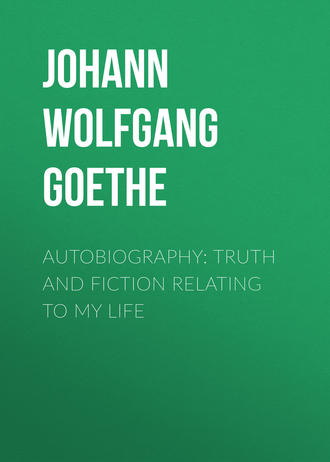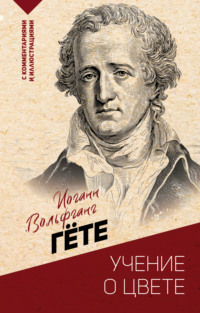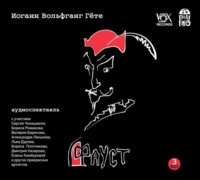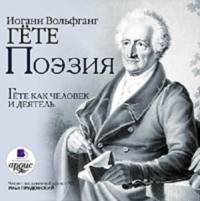 полная версия
полная версияAutobiography: Truth and Fiction Relating to My Life
The Poet, says Schiller, is a citizen not only of his country, but of his time. Whatever occupies and interests men in general, will interest him still more. That nameless Unrest, the blind struggle of a soul in bondage, that high, sad, longing Discontent, which was agitating every bosom, had driven Goethe almost to despair. All felt it; he alone could give it voice. And here lies the secret of his popularity; in his deep, susceptive heart, he felt a thousand times more keenly what every one was feeling; with the creative gift which belonged to him as a poet, he bodied it forth into visible shape, gave it a local habitation and a name; and so made himself the spokesman of his generation. /Werter/ is but the cry of that dim, rooted pain, under which all thoughtful men of a certain age were languishing: it paints the misery, it passionately utters the complaint; and heart and voice, all over Europe, loudly and at once respond to it. True, it prescribes no remedy; for that was a far different, far harder enterprise, to which other years and a higher culture were required; but even this utterance of the pain, even this little, for the present, is ardently grasped at, and with eager sympathy appropriated in every bosom. If Byron's life-weariness, his moody melancholy, and mad stormful indignation, borne on the tones of a wild and quite artless melody, could pierce so deep into many a British heart, now that the whole matter is no longer new, – is indeed old and trite, – we may judge with what vehement acceptance this /Werter/ must have been welcomed, coming as it did like a voice from unknown regions; the first thrilling peal of that impassioned dirge, which, in country after country, men's ears have listened to, till they were deaf to all else. For /Werter/ infusing itself into the core and whole spirit of Literature, gave birth to a race of Sentimentalists, who have raged and wailed in every part of the world, till better light dawned on them, or at worst, exhausted Nature laid herself to sleep, and it was discovered that lamenting was an unproductive labour. These funereal choristers, in Germany a loud, haggard, tumultuous, as well as tearful class, were named the /Kraftmänner/ or Power-men; but have all long since, like sick children, cried themselves to rest. Byron was our English Sentimentalist and Power-man; the strongest of his kind in Europe; the wildest, the gloomiest, and it may be hoped the last. For what good is it to 'whine, put finger i' the eye, and sob,' in such a case? Still more, to snarl and snap in malignant wise, 'like dog distract, or monkey sick?' Why should we quarrel with our existence, here as it lies before us, our field and inheritance, to make or mar, for better or for worse; in which, too, so many noblest men have, even from the beginning, warring with the very evils we war with, both made and been what will be venerated to all time?
A wide and everyway most important interval divides /Werter/, with its sceptical philosophy and 'hypochondriacal crotchets,' from Goethe's next Novel, /Wilhelm Meister's Apprenticeship/, published some twenty years afterwards. This work belongs, in all senses, to the second and sounder period of Goethe's life, and may indeed serve as the fullest, if perhaps not the purest, impress of it; being written with due forethought, at various times, during a period of no less than ten years. Considered as a piece of Art, there were much to be said on /Meister/; all which, however, lies beyond our present purpose. We are here looking at the work chiefly as a document for the writer's history; and in this point of view, it certainly seems, as contrasted with its more popular precursor, to deserve our best attention: for the problem which had been stated in /Werter/, with despair of its solution, is here solved. The lofty enthusiasm, which, wandering wildly over the universe, found no resting-place, has here reached its appointed home; and lives in harmony with what long appeared to threaten it with annihilation. Anarchy has now become Peace; the once gloomy and perturbed spirit is now serene, cheerfully vigorous, and rich in good fruits. Neither, which is most important of all, has this Peace been attained by a surrender to Necessity, or any compact with Delusion; a seeming blessing, such as years and dispiritment will of themselves bring to most men, and which is indeed no blessing, since even continued battle is better than destruction or captivity; and peace of this sort is like that of Galgacus's Romans, who 'called it peace when they had made a desert.' Here the ardent high-aspiring youth has grown into the calmest man, yet with increase and not loss of ardour, and with aspirations higher as well as clearer. For he has conquered his unbelief; the Ideal has been built on the Actual; no longer floats vaguely in darkness and regions of dreams, but rests in light, on the firm ground of human interest and business, as in its true scene, on its true basis.
It is wonderful to see with, what softness the scepticism of Jarno, the commercial spirit of Werner, the reposing polished manhood of Lothario and the Uncle, the unearthly enthusiasm of the Harper, the gay animal vivacity of Philina, the mystic, ethereal, almost spiritual nature of Mignon, are blended together in this work; how justice is done to each, how each lives freely in his proper element, in his proper form; and how, as Wilhelm himself, the mild-hearted, all-hoping, all-believing Wilhelm, struggles forward towards his world of Art through these curiously complected influences, all this unites itself into a multifarious, yet so harmonious Whole; as into a clear poetic mirror, where man's life and business in this age, his passions and purposes, the highest equally with the lowest, are imaged back to us in beautiful significance. Poetry and Prose are no longer at variance; for the poet's eyes are opened; he sees the changes of many-colored existence, and sees the loveliness and deep purport which lies hidden under the very meanest of them; hidden to the vulgar sight, but clear to the poet's; because the 'open secret' is no longer a secret to him, and he knows that the Universe is /full/ of goodness; that whatever has being has beauty.
Apart from its literary merits or demerits, such is the temper of mind we trace in Goethe's /Meister/, and, more or less expressly exhibited, in all his later works. We reckon it a rare phenomenon, this temper; and worthy, in our times, if it do exist, of best study from all inquiring men. How has such a temper been attained in this so lofty and impetuous mind, once too, dark, desolate and full of doubt, more than any other? How may we, each of us in his several sphere, attain it, or strengthen it, for ourselves? These are questions, this last is a question, in which no one is unconcerned.
To answer these questions, to begin the answer of them, would lead us very far beyond our present limits. It is not, as we believe, without long, sedulous study, without learning much and unlearning much, that, for any man, the answer of such questions is even to be hoped. Meanwhile, as regards Goethe, there is one feature of the business, which, to us, throws considerable light on his moral persuasions, and will not, in investigating the secret of them, be overlooked. We allude to the spirit in which he cultivates his Art; the noble, disinterested, almost religious love with which he looks on Art in general, and strives towards it as towards the sure, highest, nay only good.
For a man of Goethe's talent to write many such pieces of rhetoric, setting forth the dignity of poets, and their innate independence on external circumstances, could be no very hard task; accordingly, we find such sentiments again and again expressed, sometimes with still more gracefulness, still clearer emphasis, in his various writings. But to adopt these sentiments into his sober practical persuasion; in any measure to feel and believe that such was still, and must always be, the high vocation of the poet; on this ground of universal humanity, of ancient and now almost forgotten nobleness, to take his stand, even in these trivial, jeering, withered, unbelieving days; and through all their complex, dispiriting, mean, yet tumultuous influences, to 'make his light shine before them,' that it might beautify even our 'rag- gathering age' with some beams of that mild, divine splendour, which had long left us, the very possibility of which was denied; heartily and in earnest to meditate all this, was no common proceeding; to bring it into practice, especially in such a life as his has been, was among the highest and hardest enterprises which any man whatever could engage in. We reckon this a greater novelty, than all the novelties which as a mere writer he ever put forth, whether for praise or censure. We have taken it upon us to say that if such is, in any sense, the state of the case with regard to Goethe, he deserves not mere approval as a pleasing poet and sweet singer; but deep, grateful study, observance, imitation, as a Moralist and Philosopher. If there be any /probability/ that such is the state of the case, we cannot but reckon it a matter well worthy of being inquired into. And it is for this only that we are here pleading and arguing. Meister is the mature product of the first genius of our times; and must, one would think, be different, in various respects, from the immature products of geniuses who are far from the first, and whose works spring from the brain in as many weeks as Goethe's cost him years.
It may deserve to be mentioned here that Meister, at its first appearance in Germany, was received very much as it has been in England. Goethe's known character, indeed, precluded indifference there; but otherwise it was much the same. The whole guild of criticism was thrown into perplexity, into sorrow; everywhere was dissatisfaction open or concealed. Official duty impelling them to speak, some said one thing, some another; all felt in secret that they knew not what to say. Till the appearance of Schlegel's /Character/, no word, that we have seen, of the smallest chance to be decisive, or indeed to last beyond the day, had been uttered regarding it. Some regretted that the fire of /Werter/ was so wonderfully abated; whisperings there might be about 'lowness,' 'heaviness;' some spake forth boldly in behalf of suffering 'virtue.' Novalis was not among the speakers, but he censured the work in secret, and this for a reason which to us will seem the strangest; for its being, as we should say, a Benthamite work! Many are the bitter aphorisms we find, among his Fragments, directed against /Meister/ for its prosaic, mechanical, economical, coldhearted, altogether Utilitarian character. We English again call Goethe a mystic; so difficult is it to please all parties! But the good, deep, noble Novalis made the fairest amends; for notwithstanding all this, Tieck tells us, if we remember rightly, he continually returned to /Meister/, and could not but peruse and reperuse it.
Goethe's /Wanderjahre/ was published in his seventy-second year; /Werter/ in his twenty-fifth; thus in passing between these two works, and over /Meister's Lehrjahre/ which stands nearly midway, we have glanced over a space of almost fifty years, including within them, of course, whatever was most important in his public or private history. By means of these quotations, so diverse in their tone, we meant to make it visible that a great change had taken place in the moral disposition of the man; a change from inward imprisonment, doubt and discontent, into freedom, belief and clear activity; such a change as, in our opinion, must take place, more or less consciously, in every character that, especially in these times, attains to spiritual manhood, and in characters possessing any thoughtfulness and sensibility, will seldom take place without a too painful consciousness, without bitter conflicts, in which the character itself is too often maimed and impoverished, and which end too often not in victory, but in defeat, or fatal compromise with the enemy. Too often, we may well say; for though many gird on the harness, few bear it warrior-like; still fewer put it off with triumph. Among our own poets, Byron was almost the only man we saw faithfully and manfully struggling, to the end, in this cause; and he died while the victory was still doubtful, or at best, only beginning to be gained. We have already stated our opinion, that Goethe's success in this matter has been more complete than that of any other man in his age; nay, that, in the strictest sense, he may almost be called the only one that has so succeeded. On this ground, were it on no other, we have ventured to say that his spiritual history and procedure must deserve attention; that his opinions, his creations, his mode of thought, his whole picture of the world as it dwells within him, must to his contemporaries be an inquiry of no common interest; of an interest altogether peculiar, and not in this degree exampled in existing literature. These things can be but imperfectly stated here, and must be left, not in a state of demonstration, but at the utmost, of loose fluctuating probability; nevertheless, if inquired into, they will be found to have a precise enough meaning, and, as we believe, a highly important one.
For the rest, what sort of mind it is that has passed through this change, that has gained this victory; how rich and high a mind; how learned by study in all that is wisest, by experience in all that is most complex, the brightest as well as the blackest, in man's existence; gifted with what insight, with what grace and power of utterance, we shall not for the present attempt discussing. All these the reader will learn, who studies his writings with such attention as they merit; and by no other means. Of Goethe's dramatic, lyrical, didactic poems, in their thousandfold expressiveness, for they are full of expressiveness, we can here say nothing. But in every department of Literature, of Art ancient and modern, in many provinces of Science, we shall often meet him; and hope to have other occasions of estimating what, in these respects, we and all men owe him.
Two circumstances, meanwhile, we have remarked, which to us throw light on the nature of his original faculty for Poetry, and go far to convince us of the Mastery he has attained in that art: these we may here state briefly, for the judgment of such as already know his writings, or the help of such as are beginning to know them. The first is his singularly emblematic intellect; his perpetual never-failing tendency to transform into /shape/, into /life/, the opinion, the feeling that may dwell in him; which, in its widest sense, we reckon to be essentially the grand problem of the Poet. We do not mean mere metaphor and rhetorical trope: these are but the exterior concern, often but the scaffolding of the edifice, which is to be built up (within our thoughts) by means of them. In allusions, in similitudes, though no one known to us is happier, many are more copious than Goethe. But we find this faculty of his in the very essence of his intellect; and trace it alike in the quiet cunning epigram, the allegory, the quaint device, reminding us of some Quarles or Bunyan; and in the /Fausts/, the /Tassos/, the /Mignons/, which in their pure and genuine personality, may almost remind us of the /Ariels/ and /Hamlets/ of Shakespeare. Everything has form, everything has visual existence; the poet's imagination /bodies forth/ the forms of things unseen, his pen turns them to /shape/. This, as a natural endowment, exists in Goethe, we conceive, to a very high degree.
The other characteristic of his mind, which proves to us his acquired mastery in art, as this shows us the extent of his original capacity for it, is his wonderful variety, nay universality; his entire freedom from the Mannerism. We read Goethe for years, before we come to see wherein the distinguishing peculiarity of his understanding, of his disposition, even of his way of writing, consists. It seems quite a simple style that of his; remarkable chiefly for its calmness, its perspicuity, in short its commonness; and yet it is the most uncommon of all styles: we feel as if every one might imitate it, and yet it is inimitable. As hard is it to discover in his writings, – though there also, as in every man's writings, the character of the writer must lie recorded, – what sort of spiritual construction he has, what are his temper, his affections, his individual specialties. For all lives freely within him: Philina and Clanchen, Mephistopheles and Mignon, are alike indifferent, or alike dear to him; he is of no sect or caste: he seems not this man or that man, but a man. We reckon this to be the characteristic of a Master in Art of any sort; and true especially of all great Poets. How true is it of Shakespeare and Homer! Who knows, or can figure what the Man Shakespeare was, by the first, by the twentieth perusal of his works? He is a Voice coming to us from the Land of Melody: his old brick dwelling- place, in the mere earthly burgh of Stratford-on-Avon, offers us the most inexplicable enigma. And what is Homer in the /Ilias/? He is THE WITNESS; he has seen, and he reveals it; we hear and believe, but do not behold him. Now compare, with these two Poets, any other two; not of equal genius, for there are none such, but of equal sincerity, who wrote as earnestly and from the heart, like them. Take, for instance, Jean Paul and Lord Byron. The good Eichter begins to show himself, in his broad, massive, kindly, quaint significance, before we have read many pages of even his slightest work; and to the last he paints himself much better than his subject. Byron may also be said to have painted nothing else than himself, be his subject what it might. Yet as a test for the culture of a Poet, in his poetical capacity, for his pretensions to mastery and completeness in his art, we cannot but reckon this among the surest. Tried by this, there is no writer that approaches within many degrees of Goethe.
JOHANN WOLFGANG VON GOETHEJohann Wolfgang von Goethe was born in Frankfort on August 28, 1749. His parents were citizens of that imperial town, and Wolfgang was their only son. His father was born on July 31, 1710. He married, on August 20, 1748, at the age of thirty-eight, Catherine Elizabeth Textor. In December, 1750, was born a daughter, Cornelia, who remained until her death, at the age of twenty-seven, her brother's most intimate friend. She was married in 1773 to John George Schlosser. Goethe's education was irregular. French culture gave at this time the prevailing tone to Europe. Goethe could not have escaped its influence, and he was destined to fall under it in a special manner. In the Seven Years' War, which was now raging, France took the side of the empire against Frederick the Great. Frankfort was full of French soldiers, and a certain Comte Thorane, who was quartered in Goethe's house, had an important influence on the boy.
Goethe, if we may believe his autobiography, experienced his first love about the age of fifteen in the person of Gretchen, whom some have supposed to be the daughter of an innkeeper at Offenbach. He worshipped her as Dante worshipped Beatrice.
In the autumn of 1765 Goethe traveled to Leipsic. On the 19th of October he was admitted as a student. He was sent to Leipsic to study law, in order that he might return to Frankfort fitted for the regular course of municipal distinction. He intended to devote himself not to law, but to belles lettres. He attended Gellert's lectures on literature, and even joined his private class. His real university education was derived from intercourse with his friends. First among these was J. G. Schlosser, who afterwards married his sister. He had a great influence upon him, chiefly in introducing him to a wider circle of German, French, English and Italian poetry.
But the person who had the strongest effect on Goethe's mental development was Adam Frederick Oeser, at this time director of the academy of arts in Leipsic.
Goethe, from his earliest years, was never without a passion, and at Leipsic his passion was Kitty Schönkopf, the Aennchen of the autobiography, the daughter of the host at whose house he dined. She often teased him with her inconstant ways, and to this experience is due his first drama, "Die Laune des Verliebten," "Lovers' Quarrels," as it may be styled. A deeper chord is struck in "Die Mitschuldigen" (The Fellow Sinners), which forms a dismal and forbidding picture both of the time and of the experiences of the youth who wrote it. He had an opportunity of establishing his principles of taste during a short visit at Dresden, in which he devoted himself to the pictures and the antiques. The end of Goethe's stay at Leipsic was saddened by illness. One morning at the beginning of the summer he was awakened by a violent hemorrhage. For several days he hung between life and death, and after that his recovery was slow. He left Leipsic far from well on August 28, 1768.
Goethe made an enforced stay of a year and a half. It was perhaps the least happy part of his life. His cure proceeded slowly, and he had several relapses. His family relations were not pleasant. His father showed but little sympathy with his aspirations for universal culture, and could imagine no career for him but that of a successful jurist. His sister had grown somewhat harsh and cold during his absence. Goethe's mother was always the same to him – a bright, genial, sympathetic friend. Goethe, during his illness, received great attention from Fräulein von Klettenberg, a friend of his mother's, a pietist of the Moravian school. She initiated him into the mystical writings of those abstracted saints, and she engaged him in the study of alchemy, which served at once to prepare him for the conception of Faust and for the scientific researches of his later days.
He arrived at Strasburg April 2,1770. Goethe stayed in Strasburg till August 28, 1771, his twenty-second birthday, and these sixteen months are perhaps the most important of his life. During them he came into active contact with most of those impulses of which his after life was a development. If we would understand his mental growth, we must ask who were his friends. He took his meals at the house of the Fräulein Lauth in the Kramergasse. The table was mainly filled with medical students. At the head of it sat Salzmann, a grave man of fifty years of age. His experience and his refined taste were very attractive to Goethe, who made him his intimate friend. The table of the Fräulein Lauth received some new guests. Among these was Jung-Stilling, the self-educated charcoal-burner, who in his memoir has left a graphic account of Goethe's striking appearance, in his broad brow, his flashing eye, his mastery of the company, and his generosity. Another was Lerse, a frank, open character, who became Goethe's favorite, and whose name is immortalized in Götz von Berlichingen.
Goethe's stay at Strasburg is generally connected still more closely with another circumstance – his passion for Frederike Brion of Sesenheim. The village lies about twenty miles from Strasburg, and her father was pastor there. Goethe was introduced by his friend Weyland, as a poor theological student. The father was a simple, worthy man, the eldest of the three daughters was married, the two younger remained – Maria Salome, and Frederike, to whom the poet principally devoted himself. She was tall and slight, with fair hair and blue eyes, and just sixteen years of age. Goethe gave himself up to the passion of the moment. During the winter of 1770, Goethe often rode over to Sesenheim. Neither storm, nor cold, nor darkness kept him back. As his time for leaving Strasburg came nearer he felt that his love was merely a dream and could have no serious termination. Frederike felt the same on her side. On August 6th Goethe took his degree as a doctor of law. Shortly afterwards he bade adieu to Sesenheim. Frederike lived till 1813 and died single.
Goethe's return to Frankfort is marked by a number of songs, of which the "Wanderer's Sturmlied" is the most remarkable. He had outgrown many of the friends of his youth. Those with whom he felt most sympathy were the two Schlossers and his sister Cornelia. He found in her one who sympathized with all his aspirations. The work into which he threw all his genius was the dramatization of the history of the imperial knight of the Middle Ages, Gottfried or Götz von Berlichingen. The immediate cause of this enterprise was his enthusiasm for Shakespeare. After reading him he felt, he said, like a blind man who suddenly receives his sight. The study of a dry and dull biography of Götz, published in 1731, supplied the subject for his awakened powers. From this miserable sketch he conceived within his mind a complete picture of Germany in the sixteenth century. The chief characters of his play are creatures of his imagination, representing the principal types which made up the history of the time. Every personage is made to live; they speak in short, sharp sentences like the powerful lines of a great master's drawing. The first sketch of Götz was finished in six weeks, in the autumn of 1771. It ran like wild-fire through the whole of Germany.









